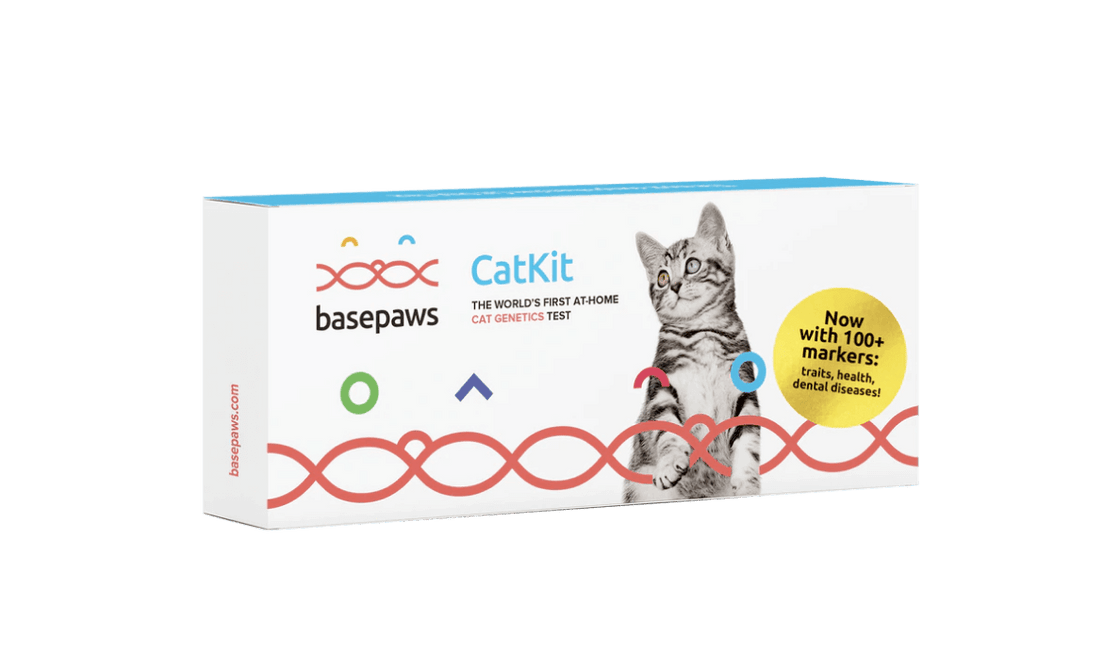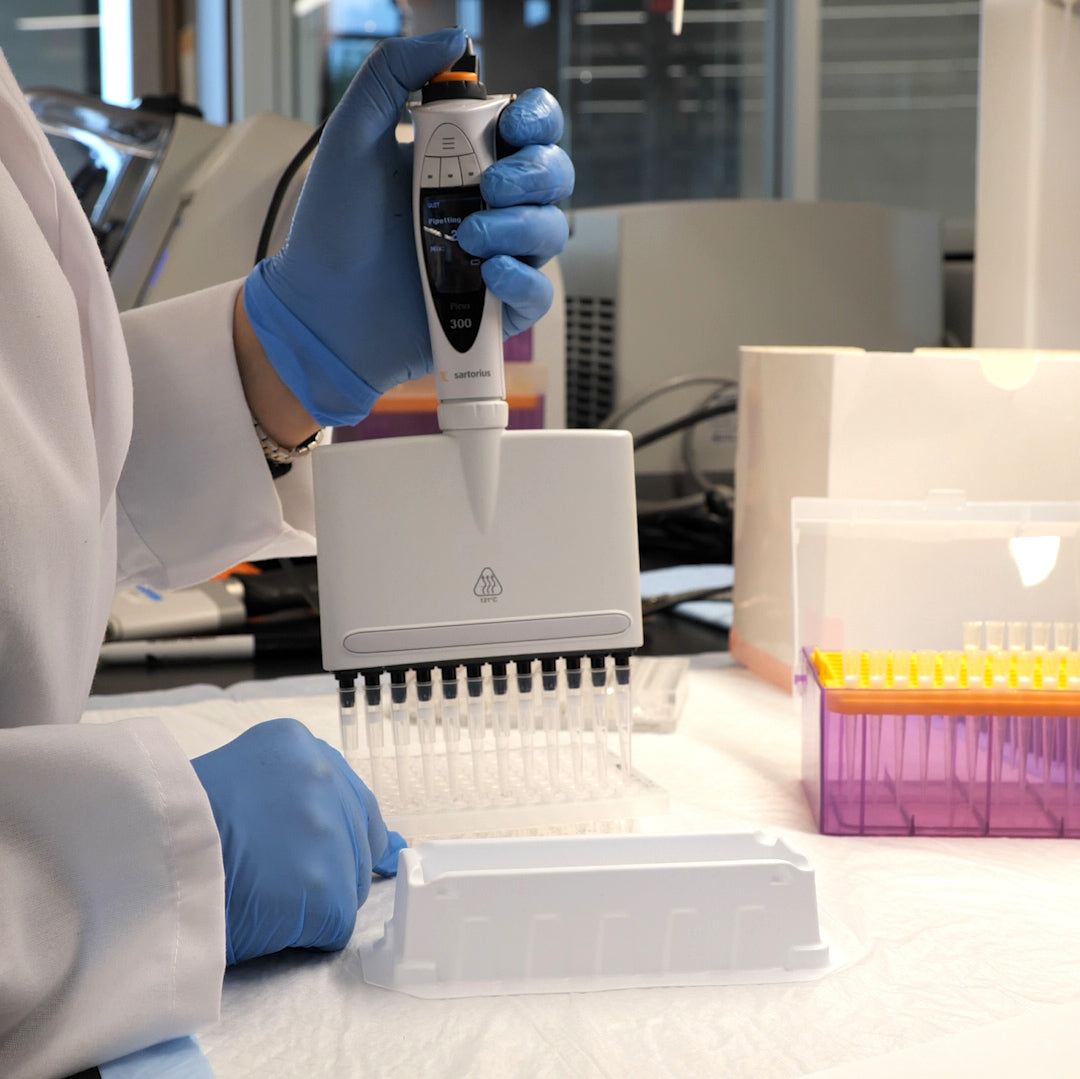Partners in Research and Innovation
We are proud to partner with citizen scientists and industry professionals on research that delivers actionable knowledge to help people make empowered, proactive decisions for the health and well-being of their pets.

Join the Basepaws citizen science community and help us redefine approaches to proactive pet care.
Citizen science research programs evolve our understanding of the genetic and oral microbiome factors associated with a pet’s increased risk for certain diseases, so that we can develop screening tools that recognize signs of disease earlier. These tools can give pet parents and veterinarians more opportunities to address issues sooner and collaborate on treatment plans that are individualized for a pet’s unique needs.
Review the programs below to learn more about how you can participate in research that has the potential to create a healthier, happier future for pets everywhere.
Feline atopic dermatitis (AD), also known as feline atopy or non-flea non-food allergic dermatitis, is the second most common allergy in cats (after flea allergy dermatitis). Estimates reveal that this disease affects 12.5 percent of the domestic cat population. If your cat has been diagnosed with AD, their oral swab sample could help us to better understand the biology behind this highly prevalent disease.
Confirmed diagnosis of atopic dermatitis by a veterinarian and/or veterinary dermatologist.
Unrelated ophthalmic, respiratory, or dermatological conditions, including flea bite hypersensitivity, adverse food reaction, sarcoptic mange, pyoderma, yeast infection, and contact dermatitis. Current use of antibiotic, antiviral, or antifungal medications, as well as probiotic supplements.
CKD is a major feline health issue from which one in 30 cats suffer, often going undiagnosed in cats until the illness reaches a more advanced stage. If your cat has been diagnosed with CKD, especially before the age of five, we welcome your participation in this study.
Confirmed diagnosis of CKD by a veterinarian.
Unrelated hyperthyroidism, UTI, systemic hypertension, hypoadrenocorticism, nephrolithiasis and ureterolithiasis.
Feline diabetes (Type II) is the second most common endocrine disorder in cats. Our research aims to better understand the genetic and oral microbiome factors associated with a cat’s increased risk for the disease. If your cat has been diagnosed with Type II diabetes, please consider applying to this program before May 31, 2022.
Confirmed diagnosis of diabetes mellitus (Type II) by a veterinarian.
Renal glycosuria, stress hyperglycemia, unrelated pancreatitis, hyperadrenocorticism, acromegaly, or currently on medications such as glucocorticoids or progestogens.
Food allergic dermatitis often presents with year-round skin inflammation and itching-related discomfort. Unfortunately, this condition is an increasingly common problem seen in cats. If your cat is suffering from food allergic dermatitis, we welcome you to participate in our study to help us better understand the genetics and oral microbiome factors that may be associated with food allergies in cats.
Confirmed diagnosis of food allergic dermatitis by a veterinarian and/or veterinary dermatologist.
Unrelated ophthalmic, respiratory, or dermatological conditions, including flea bite hypersensitivity, atopic dermatitis, sarcoptic mange, pyoderma, yeast infection, contact dermatitis, superficial bacterial folliculitis, Malassezia dermatitis, otitis externa, and media. Current use of antibiotic, antiviral, or antifungal medications, as well as probiotic supplements.
Feline GI lymphoma is a notoriously hard-to-diagnose disease that is often confused with inflammatory bowel disease (IBD). If your cat has been diagnosed with B cell (large cell) or T cell (small cell) GI lymphoma, their sample can really make a difference in the development of better early detection screening tools for this disease.
Confirmed diagnosis of GI lymphoma by veterinarian, and not previously vaccinated for Feline Leukemia Virus.
Unrelated hyperthyroidism, intestinal neoplasia, adverse food reactions, renal and hepatic insufficiency, EPI, intestinal parasitism, enteropathy.
Is your cat healthy? Basepaws is looking for cats that have not been diagnosed with any dental, chronic, or systemic diseases, and do not currently present with an active illness (or have within the last month). If your cat is one year of age or older and has received a clean bill of health from the veterinarian within the past six months, you may qualify for this feline health research effort.
Veterinary evaluation within the last six months confirming the absence of any chronic or acute diseases.
Acute illness with onset that occurred within the last month, or that is currently present. Current use of antibiotic, antiviral, or antifungal medications, as well as probiotic supplements.
IBD is a non-cancerous condition which causes chronic irritation and inflammation of a cat’s gastrointestinal tract. If your cat has been diagnosed with IBD, especially the idiopathic form, their oral swab sample could help us uncover genetic and microbiome factors associated with increased risk of developing IBD and improve capacity for earlier detection and accurate diagnoses of IBD.
Confirmed diagnosis of IBD by a veterinarian.
Unrelated hyperthyroidism, intestinal neoplasia, adverse food reactions, viral infections (FeLV, FIV), renal and hepatic insufficiency, EPI, intestinal parasitism, enteropathy.
Anecdotal evidence suggests that the oldest cat on record lived to be 35 years old! We believe that a deeper understanding of the genetic factors that contribute to feline longevity may help increase a cat’s lifespan, but more importantly, do so in ways that enhance enjoyment of their golden years with fewer instances of pain and illness. There are ongoing studies focused on canine longevity, but no such studies exist for cats. If you have a cat aged 17 or older, they could be a perfect candidate for this groundbreaking research to help us better understand the genetic health markers associated with feline longevity.
Cats aged 17 years or older.
Cats younger than 17 years of age.
Feline atopic dermatitis (AD), also known as feline atopy or non-flea non-food allergic dermatitis, is the second most common allergy in cats (after flea allergy dermatitis). Estimates reveal that this disease affects 12.5 percent of the domestic cat population. If your cat has been diagnosed with AD, their oral swab sample could help us to better understand the biology behind this highly prevalent disease.
Confirmed diagnosis of atopic dermatitis by a veterinarian and/or veterinary dermatologist.
Unrelated ophthalmic, respiratory, or dermatological conditions, including flea bite hypersensitivity, adverse food reaction, sarcoptic mange, pyoderma, yeast infection, and contact dermatitis. Current use of antibiotic, antiviral, or antifungal medications, as well as probiotic supplements.
CKD is a major feline health issue from which one in 30 cats suffer, often going undiagnosed in cats until the illness reaches a more advanced stage. If your cat has been diagnosed with CKD, especially before the age of five, we welcome your participation in this study.
Confirmed diagnosis of CKD by a veterinarian.
Unrelated hyperthyroidism, UTI, systemic hypertension, hypoadrenocorticism, nephrolithiasis and ureterolithiasis.
Feline diabetes (Type II) is the second most common endocrine disorder in cats. Our research aims to better understand the genetic and oral microbiome factors associated with a cat’s increased risk for the disease. If your cat has been diagnosed with Type II diabetes, please consider applying to this program before May 31, 2022.
Confirmed diagnosis of diabetes mellitus (Type II) by a veterinarian.
Renal glycosuria, stress hyperglycemia, unrelated pancreatitis, hyperadrenocorticism, acromegaly, or currently on medications such as glucocorticoids or progestogens.
Food allergic dermatitis often presents with year-round skin inflammation and itching-related discomfort. Unfortunately, this condition is an increasingly common problem seen in cats. If your cat is suffering from food allergic dermatitis, we welcome you to participate in our study to help us better understand the genetics and oral microbiome factors that may be associated with food allergies in cats.
Confirmed diagnosis of food allergic dermatitis by a veterinarian and/or veterinary dermatologist.
Unrelated ophthalmic, respiratory, or dermatological conditions, including flea bite hypersensitivity, atopic dermatitis, sarcoptic mange, pyoderma, yeast infection, contact dermatitis, superficial bacterial folliculitis, Malassezia dermatitis, otitis externa, and media. Current use of antibiotic, antiviral, or antifungal medications, as well as probiotic supplements.
Feline GI lymphoma is a notoriously hard-to-diagnose disease that is often confused with inflammatory bowel disease (IBD). If your cat has been diagnosed with B cell (large cell) or T cell (small cell) GI lymphoma, their sample can really make a difference in the development of better early detection screening tools for this disease.
Confirmed diagnosis of GI lymphoma by veterinarian, and not previously vaccinated for Feline Leukemia Virus.
Unrelated hyperthyroidism, intestinal neoplasia, adverse food reactions, renal and hepatic insufficiency, EPI, intestinal parasitism, enteropathy.
Is your cat healthy? Basepaws is looking for cats that have not been diagnosed with any dental, chronic, or systemic diseases, and do not currently present with an active illness (or have within the last month). If your cat is one year of age or older and has received a clean bill of health from the veterinarian within the past six months, you may qualify for this feline health research effort.
Veterinary evaluation within the last six months confirming the absence of any chronic or acute diseases.
Acute illness with onset that occurred within the last month, or that is currently present. Current use of antibiotic, antiviral, or antifungal medications, as well as probiotic supplements.
IBD is a non-cancerous condition which causes chronic irritation and inflammation of a cat’s gastrointestinal tract. If your cat has been diagnosed with IBD, especially the idiopathic form, their oral swab sample could help us uncover genetic and microbiome factors associated with increased risk of developing IBD and improve capacity for earlier detection and accurate diagnoses of IBD.
Confirmed diagnosis of IBD by a veterinarian.
Unrelated hyperthyroidism, intestinal neoplasia, adverse food reactions, viral infections (FeLV, FIV), renal and hepatic insufficiency, EPI, intestinal parasitism, enteropathy.
Anecdotal evidence suggests that the oldest cat on record lived to be 35 years old! We believe that a deeper understanding of the genetic factors that contribute to feline longevity may help increase a cat’s lifespan, but more importantly, do so in ways that enhance enjoyment of their golden years with fewer instances of pain and illness. There are ongoing studies focused on canine longevity, but no such studies exist for cats. If you have a cat aged 17 or older, they could be a perfect candidate for this groundbreaking research to help us better understand the genetic health markers associated with feline longevity.
Cats aged 17 years or older.
Cats younger than 17 years of age.

Pet parents of qualifying pets (who are based in the U.S. and not already Basepaws customers) will get a free oral swab kit to collect a DNA sample. Shipping in the U.S. is also free both ways! Qualifying participants who are not current Basepaws customers will also receive a free signature Basepaws DNA report as a thank you for contributing to our citizen science research program.
Duis bibendum in leo vel tincidunt. Praesent aliquam eget mauris a suscipit. Interdum et malesuada fames ac ante ipsum primis in faucibus. Vestibulum pharetra tellus nec velit auctor sagittis. Etiam eu tristique neque, et eleifend nisl. Pellentesque habitant morbi tristique senectus et netus et malesuada fames ac turpis egestas.


Did you know?
Humans and cats share nearly 90.2% DNA! There are also over 200 inherited human diseases that closely resemble those seen in cats. This impressive amount of genomic similarity means that the potential applications for Basepaws’ genetics research extend to humans. This is something we’re exploring in our feline longevity research, which could potentially one day contribute to new therapeutics for age-related human diseases.

Our Science
Discover the cutting-edge science behind the Basepaws breed, oral microbiome, and health and trait marker analyses.













